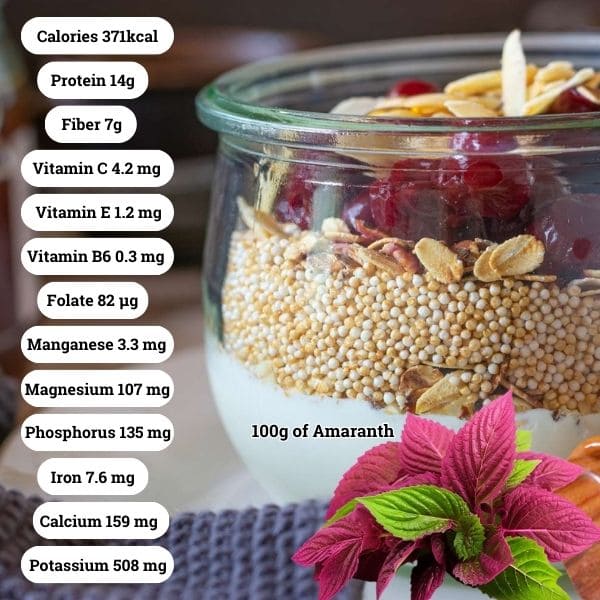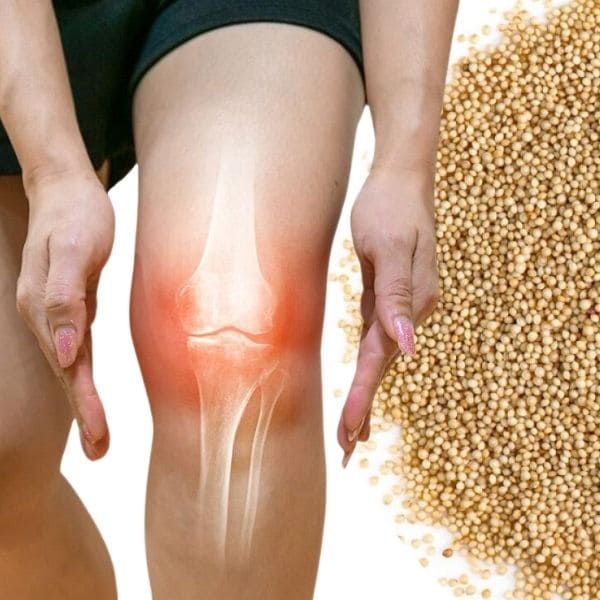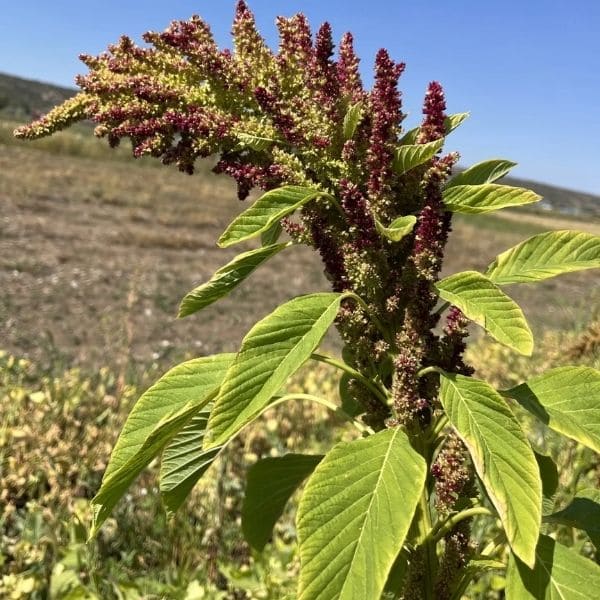Pigweed, an ancient grain originating from Central and South America, has been cultivated for thousands of years.
Known scientifically as Amaranthus, this versatile plant was a staple food for the Aztecs and has been revered for its nutritional and health benefits.
Today, pigweed is gaining popularity worldwide due to its rich nutrient profile and other numerous advantages.
Summary:
- Pigweed‘s leaves and seeds are rich in protein, fiber, vitamins, and minerals offering substantial nutritional benefits and supporting various dietary needs.
- Regular consumption of pigweed can aid in digestive health, heart health, blood sugar regulation, and immune support.
- Pigweed can improve soil health and support local ecosystems.
Nutritional Profile of Pigweed
Nutritional Value in Pigweed

A 100-gram serving of pigweed contains:
- Calories: 371 kcal
- Protein: 14 grams
- Fiber: 7 grams
- Vitamin C: 4.2 milligrams
- Vitamin E: 1.2 milligrams
- Vitamin B6: 0.3 milligrams
- Folate: 82 micrograms
- Manganese: 3.3 milligrams (97% of the RDI)
- Magnesium: 107 milligrams (29% of the RDI)
- Phosphorus: 135 milligrams (22% of the RDI)
- Iron: 7.6 milligrams (42% of the RDI)
- Calcium: 159 milligrams (16% of the RDI)
- Potassium: 508 milligrams
Besides 371 calories and 14 grams protein in 100 grams of pigweed, it includes all nine essential amino acids making pigweed an excellent choice for vegetarians and vegans.
When compared to spinach which is often praised for its nutrient density, it provides only about 2.9 grams of protein per 100 grams, far less than pigweed.
Additionally, while spinach offers a good amount of vitamins A and C, pigweed provides a broader spectrum of nutrients, including a substantial amount of vitamins B6, E, and folate.
Antioxidant-Rich

The key antioxidants found in pigweed include rutin and nicotiflorin which are known for strong anti-inflammatory properties and ability to protect cells fromoxidative stress.
In addition, oxidative stress caused by free radicals can lead to chronic diseases and aging.
The antioxidants in pigweed help neutralize these free radicals, thereby reducing the risk of conditions like heart disease, cancer, and neurodegenerative disorders.
Moreover, rutin has been shown to strengthen blood vessels, enhance circulation, and reduce inflammation, contributing to overall cardiovascular health.
Health Benefits of Pigweed
Digestive Health

The dietary fiber in pigweed is essential for maintaining regular bowel movements and preventing constipation.
The soluble fiber in pigweed absorbs water, forming a gel-like substance that helps soften stools and make them easier to pass.
Insoluble fiber, on the other hand, adds bulk to your stool, which aids in moving it through your digestive tract more efficiently.
Research published in the Journal of Nutrition and Food Sciences highlights the role of dietary fiber, so you can consume pigweed to maintain a healthy gut microbiome.
Heart Health
Studies have shown that the soluble fiber in pigweed can help lower cholesterol levels by binding to cholesterol molecules in the digestive system and preventing their absorption into the bloodstream.
This process helps reduce overall cholesterol levels, thereby lowering the risk of heart disease.

Additionally, pigweed contains squalene, a compound known to support cardiovascular health.
Research published in the Journal of Lipid Research indicates that squalene can help reduce cholesterol synthesis and protect against arterial plaque buildup.
The presence of magnesium in pigweed also contributes to heart health by relaxing blood vessels and promoting healthy blood pressure levels.
Immune Support

Pigweed is packed with vitamin C, which is essential for stimulating the production of white blood cells and enhancing their function to fight off infections.
Additionally, vitamin E in pigweed acts as a powerful antioxidant, protecting your cells from damage caused by free radicals and supporting immune health.
The Journal of Nutrition highlights that antioxidants like rutin and nicotiflorin in pigweed reduce inflammation and enhance the body’s natural defense mechanisms.
Moreover, the presence of zinc and magnesium in pigweed supports immune cell function and aids in maintaining a robust immune response.
Blood Sugar Regulation

Pigweed’s high fiber content, particularly soluble fiber, slows the absorption of sugars into your bloodstream, preventing spikes in blood sugar levels.
Research indicates that diets high in fiber can improve glycemic control and insulin sensitivity, which are essential for diabetes management.
Additionally, pigweed contains complex carbohydrates that are digested more slowly than simple carbs, providing a steady release of glucose into the blood.
Abundant magnesium is also linked to an increased risk of type 2 diabetes, and adequate intake can enhance insulin sensitivity.
Anti-inflammatory Properties

If you suffer from chronic inflammation, pigweed seeds are beneficial as they contain rutin and nicotiflorin, neutralizing free radicals and reducing oxidative stress.
Chronic inflammation is linked to various diseases, including heart disease, arthritis, and certain cancers.
Additionally, eating pigweed leaves can reduce inflammatory markers in the body.
A study in the American Journal of Clinical Nutrition found that higher magnesium intake is associated with lower levels of C-reactive protein (CRP), a key marker of inflammation.
Good for Bones and Teeth

With 159 milligrams of calcium per 100 grams pigweed, this vegetable helps maintain bone structure and strength, and prevent osteoporosis.
In addition, magnesium in pigweed helps with the absorption of calcium and converts vitamin D into its active form.
To maximize the benefits for your teeth and bones, experts suggest you should consume about 1/2 to 1 cup of cooked pigweed daily.
Aids in Weight Loss

A 100-gram serving of cooked pigweed contains just around 100 calories but is packed with protein, fiber, and essential vitamins and minerals.
One of the key benefits of pigweed is its ability to promote satiety and reduce cravings. The dietary fiber in pigweed slows down digestion, helping you feel full for longer periods.
Additionally, pigweed’s complex carbohydrates provide a steady release of energy, avoiding the blood sugar spikes that often lead to hunger and cravings.
Culinary Uses of Pigweed
Pigweed has a unique, nutty, and slightly earthy flavor. Its versatility makes it a popular ingredient in many cuisines around the world.
In Mexico, pigweed is often used to make “alegría,” a traditional sweet treat made by popping the seeds and mixing them with honey or syrup.
In India, pigweed is known as “rajgira” and is used in ladoos, which are sweet energy balls often consumed during fasting periods.
To incorporate pigweed into your diet, here are two simple and nutritious recipes you can refer to:
Pigweed Porridge
This porridge is a great way to start your day, providing high-quality protein, fiber, and essential vitamins that keep you full longer.

You need to prepare 1 cup pigweed, 2 cups water or milk, a pinch of salt, honey or maple syrup to taste, and fresh fruits for topping.
Firstly, you rinse the pigweed thoroughly, combine pigweed and water/milk in a pot and bring to a boil.
Next, reduce heat and simmer for 20 minutes, stirring occasionally, until the grains are tender and the mixture has thickened.
You can also add a pinch of salt and sweeten with honey or maple syrup. Finally, top with fresh fruits like berries or banana slices.
Pigweed Salad
This salad is perfect for a healthy lunch or light dinner as it offers a balance of protein, fiber, and healthy fats.

You need to prepare 1 cup cooked pigweed, 1 cup chopped vegetables (such as cucumber, tomato, and bell pepper), 1/2 cup chickpeas, 2 tablespoons olive oil, lemon juice, salt, and pepper to taste.
Firstly, you cook pigweed like the above recipe and let it cool. Next, mix cooked pigweed with chopped vegetables and chickpeas.
Finally, drizzle with olive oil and lemon juice, and season with salt and pepper, then you can enjoy the dish.
Agricultural Benefits of Pigweed
Drought Resistance

Pigweed can thrive in dry conditions, its deep-rooted system of pigweed allows it to access water from deeper soil layers, ensuring its growth even during prolonged droughts.
According to research from the Food and Agriculture Organization (FAO), cultivating drought-resistant crops like pigweed can help improve food security in regions affected by climate change.
Soil Improvement
When you grow pigweed, it adds organic matter to the soil through the decomposition of leaf litter and root biomass.
Many gardeners have incorporated this organic matter into the soil as they believe that it can enhance soil fertility, water retention, and microbial activity.
Additionally, pigweed’s deep roots help break up compacted soil, improving aeration and water infiltration.
Ecological Benefits

By incorporating pigweed into your garden, you provide a habitat and food source for various pollinators, such as bees and butterflies.
These pollinators play a crucial role in maintaining the health of ecosystems and improving crop yields.







